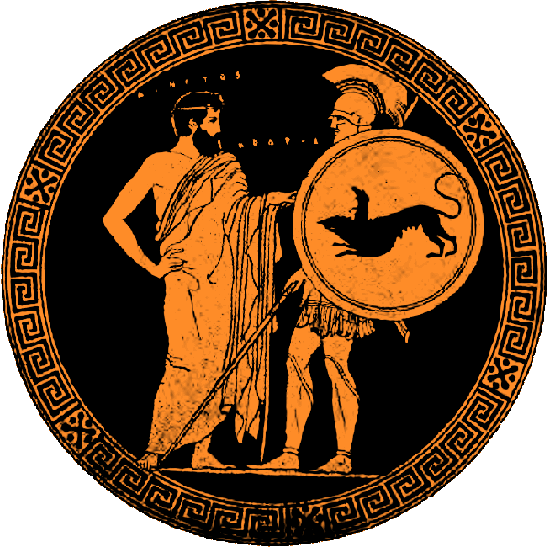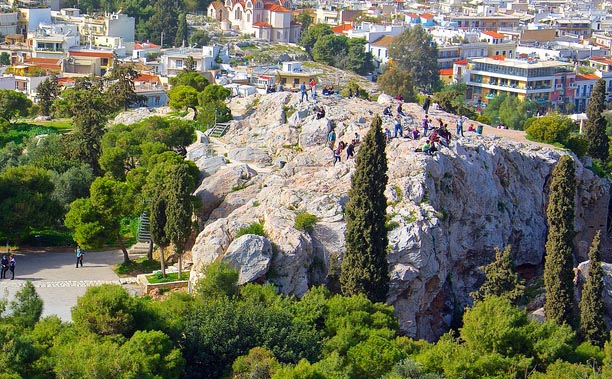Attica peninsula, which raised steeply from the Aegean Sea, in the far eastern branch of central Greece. Attica had a field, which provided a modest living conditions of farming and animal husbandry. Its coast faced the Aegean Sea, Asia Minor and the rich Orient. This position referred the inhabitants of Attica to maritime and trade. Before a unique Attica state was established, in Attica were many independent towns. Between the 10th and the 8th century. BC. Attic Synoecism was performed and resulted the Athenian polis.
Synoecism made all the inhabitants of Attica Athenians, the citizens of the Athenian polis. Every year, the Athenians celebrated the holiday of unification. Athenians were divided into 4 “tribes” (phyle): Geleontes, Hopletes, Argadeis, and Aegicoreis. Athenian state had 4 phyle, any phyle up to 3 phratries (brothers), each phratry 30 genera.
Athens government
Athens before the 8th century. BC. had a monarchy. According to tradition the last Attic king was Codrus, who was killed in the war and which could not be found a worthy successor.
After his death, the families of the strongest took over and destroyed the monarchy. Athens aristocrats king slowly seized power. First they set up their man for polemarch (commander-in-chief)., because some kings were not able to fight wars. Then all the more important given the archon king’s administration. The Archons service was initially for a lifetime, later reduced to 10 years, from 683 BC. Cr.,



Athenians elected archons each year (the first archon was Medon). With polemarch and Archons ancient Athenians had and one senior official who was Pontiff with some elements of court. He had the title of basileus. Archons, polemarch and basileus were elected each year and so all three of them began to call archons. In the middle of the 7th century. BC. the Athenians began to look once a year 6 Thesmothetai (they stored texts judgment, assumed judicial office in the most important cases, determined the legislative calendar, were responsible for dokimazete – an exam which was calculated as the readiness of candidates for master’s degree). After a while they began to be called archons and so Athens received 9 archons. They were chosen by the people gathered in the Assembly. By the disappearance of the monarchy, the real leader of the Athenian state in the period of one year was archon eponymos.



Very old administrative institutions with the Athenians the Areopagus, which in the aristocratic order was omnipotent. Each archon after the end of their service entered the chamber and was its lifelong member – councilor. Athens aristocratic council was holding hearings on a hill Areopagus, by which the Council was named. The councilors were the custodians of the state constitution. They controlled the archons and other officials and judge them if they were violated. They deliberated on the most important state affairs.
Holders of the Athenian aristocratic social order were Eupatridae, members of the most powerful families of Attica, warriors and large landowners. They tore down the kingdom and ruled Athens until the end of the 7th or the beginning of the 6th century. BC from their members archons who came into the council were elected. They performed all the important public service and had in their hands the Athenian political life. Famed were Alcmaeonid, Medontidae and other Athens eupatridae genders. The economic base of their political power were huge inalienable landed property, which was inherited property.
In contrast to eupatridae there was exploited class citizens, who were mostly farmers and craftsmen. Prior to the 6th century. BC Athenians have greatly developed their craft, maritime and trade, and improved the monetary economy. Many Athens businessmen -craftsmen, sailors and merchants who did not belong to eupatridae class, economically strengthened and were part of aristocrat of Athenian economic and social life. There was a time timocracy. Citizens were appreciated by the richest, not by the birthest. Wealthy citizens of different origin were given authority and were among elected archons. Now those nations were opposed, and that resulted a social struggles. So aristocrat Cylon unsuccessfully tried to introduce tyrannies (Cylonian affair). Athenians social problems were solved after the Draco, Solon and Cleisthenes.
